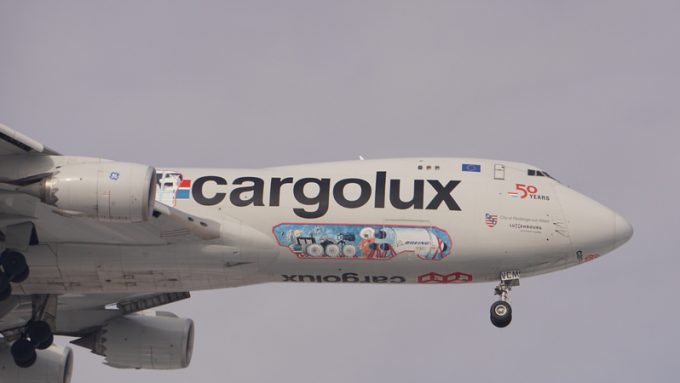Overtime ban at port of Montreal goes on as 'special mediator' is rejected
Canadian shipping stakeholder hopes of a prompt resolution of the dispute at the port of ...
GM: RAISING THE ROOF GGM: IN FULL THROTTLE GZIM: MAERSK BOOST KNIN: READ-ACROSSMAERSK: NOT ENOUGHMAERSK: GUIDANCE UPGRADEZIM: ROLLERCOASTERCAT: HEAVY DUTYMAERSK: CATCHING UP PG: DESTOCKING PATTERNSPG: HEALTH CHECKWTC: THE FALLGXO: DEFENSIVE FWRD: RALLYING ON TAKEOVER TALKODFL: STEADY YIELDVW: NEW MODEL NEEDEDWTC: TAKING PROFIT
GM: RAISING THE ROOF GGM: IN FULL THROTTLE GZIM: MAERSK BOOST KNIN: READ-ACROSSMAERSK: NOT ENOUGHMAERSK: GUIDANCE UPGRADEZIM: ROLLERCOASTERCAT: HEAVY DUTYMAERSK: CATCHING UP PG: DESTOCKING PATTERNSPG: HEALTH CHECKWTC: THE FALLGXO: DEFENSIVE FWRD: RALLYING ON TAKEOVER TALKODFL: STEADY YIELDVW: NEW MODEL NEEDEDWTC: TAKING PROFIT

Cargolux’s aircraft are back in the skies following a weekend agreement between management and two unions.
The new deal will form the basis for a Collective Work Agreement, beginning 1 September 2023 and lasting until 31 August 2027.
The unions won a salary increase of 5.5%, an indexation agreement on inflation, and reached a deal on working from home.
The unions and carrier said in a statement on Saturday night: “The strike will cease with immediate effect and all striking CWA employees will return to work.”
The decision marks a swift end to negotiations that have gone on for months – but unlike previous Cargolux CWA talks, they were for the most part carried out privately, rather than through a media lens – and managed to avoid the acrimony of previous years.
However, chief executive Richard Forson – a cautious man concerned with the long-term health of the carrier, which has seen its share of ups and downs – revealed his frustration to The Loadstar in May.
“There is a significant gap between [management and unions]. Under the CWA, employees share the profits, but the unions feel they have not been compensated under the current agreement. But the profit share has been a double-digit figure, and is not capped, and every member gets the same amount.”
He added that wages linked to the rate of inflation, which has seen numerous unions across Europe and North America call for higher salaries, was already past of the existing CMA.
Another major issue was the right to work from home, he said.
“For me it should be at the discretion of management. It was forced upon companies during Covid, but you don’t get interaction between employees.
“The unions wanted working from home to be enshrined in the CWA. We offered two days a week, but at management discretion, but they refused.”
The issue now appears to have been resolved, but Mr Forson has never hidden his desire to see Cargolux’s future safeguarded – with the pandemic riches underlining its financial security.
“My biggest responsibility as CEO is to the board and to ensure the company is economically sustainable. And it all costs money.”
He said it was not just about the carrier, but society.
“I don’t want to be doing things that affect the Luxembourg economy by setting precedents that other companies can’t do. It’s not just about Cargolux.”
But for the most part his priority was the carrier and its long-term solvency, having seen at first hand the impact of downturns.
“I need to make sure the company is sustainable, not only on CO2 emissions but a whole host of other things.
“We have set out cashflow plans for the new fleet and strategy, which includes sustainable aviation fuel (SAF), and which needs a minimum cash balance in order to be a going concern. And if Cargolux doesn’t exist, there won’t be any jobs.”
Cargolux has so far only ordered one third of its new fleet, which needs renewing. It finalised an order for ten 777-8Fs in October last year, but will need 20 more aircraft.
“For once, Cargolux has proper cash revenues to be sustainable going forward.”
Until the talks this year, relations between Mr Forson and the two unions, LCGB and the OGBLI, had appeared to be on good terms. Interviewed by The Loadstar during the pandemic, he spent at least half of the available time talking about how the company had worked hard to keep crews and staff safe: redesigning its schedule; employing nurses; opening testing facilities; and establishing its own track and trace system. He also talked about how “integrity is part of the value system of the company”.
His attitude is in stark contrast to the previously very public wars waged with unions, and no doubt helped accelerate the deal and ensure the strike, such as it was, was mercifully short.
Management and unions spoke as one on Saturday: “Cargolux remains a key pillar of the logistics industry in Luxembourg and the commitment of all parties is aimed at ensuring that this continues.”
Comment on this article